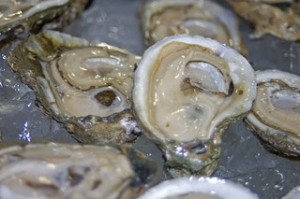
Making oysters a healthy and sustainable seafood choice is the goal of oystermen and seafood dealers across the nation and the state of Florida. New education programs for the oyster industry went into effect January 1, 2014 and were implemented by the Florida Department of Agriculture and Consumer Services (FDACS) this past spring. FDACS oversees oyster resources and seafood dealer certification.More information about FDACS division Aquaculture can be found at http://www.freshfromflorida.com/Divisions-Offices/Aquaculture .
As our fall harvest areas reopen, many local oystermen are now viewing a new 25 minute video which is now required along with a Commercial Saltwater Products License to harvest oysters commercially. Florida Fish and Wildlife Commission (FWC) issues licenses for both commercial and recreational oyster harvesters and enforces laws related to harvesting. More information regarding proper licensing can be found online at http://myfwc.com/license .
All harvesters can do their part to insure seafood safety by following important harvesting guidelines. These include time and temperature protocols in the collections and transportation of shellfish to the dealer or home. Also important, are harvest boat safety, condition, and sanitation practices. Protection of oyster resources through proper culling and following the 3” inch size limit is important to creating sustainable oyster resources. The new video provides this education and an Oyster Harvester Training Certificate for commercial harvesters is available to those who watch the video at the following FDACS and UF/IFAS Extension Offices by appointment:
FDACS Field Offices:
Melbourne Office: 321-984-4890
Port Charlotte Office: 941-613-0954
Cedar Key Office: 352-543-1084
Tallahassee Office: 850-617-7600
Apalachicola Shellfish Center: 850-653-8317
UF/IFAS Locations:
Bay County: 850-784-6105
Franklin County: 850-653-9337
Santa Rosa County: 850-623-3868
This harvesting and training information is also appropriate for recreational harvesters even though it is not required.
Recreational harvesters regulations and instructions can be found at http://myfwc.com/fishing/saltwater/recreational/shellfish .
Seafood safety is of interest to everyone,including harvesters, seafood dealers, and consumers. Each year there are a relatively small number of serious cases of foodborne illness as result of shellfish consumption. Often illness is a result of poor choices made by consumers. Consumption of raw oysters or other shellfish is not recommended for individuals with compromised immune systems. Poor immune systems are often the result of liver-disease or when chemotherapy treatment is used. Patient diagnosed with diabetes, iron overload disease, and HIV/AIDS are also advised not to consume raw shellfish.
New research also suggests another risk group are patients with acid reflux and digestive issues. Some over the counter and prescription medications, including antacids and proton pump inhibitors, increase stomach pH which allows more potentially harmful bacteria to survive ingestion, leaving patients at a higher risk for a variety of foodborne illnesses. The best advice is to consult your doctor if you have questions about whether consuming raw shellfish is appropriate for your health concern. Cooking is also a tasty way to safely prepare and enjoy shellfish. For additional guidance please visit http://safeoysters.org .
 0
0
